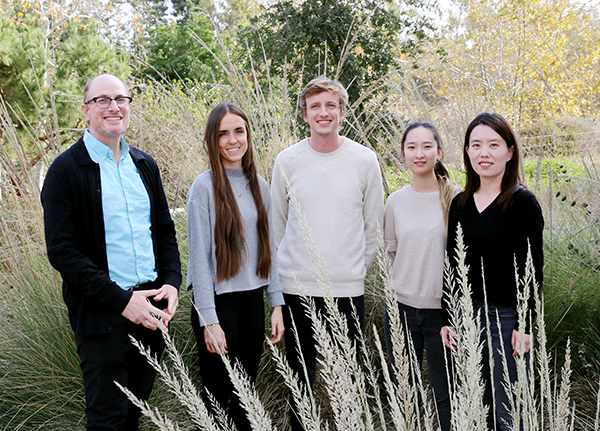UCI Team Develops Novel Tools for Biomanufacturing Useful Chemicals

March 8, 2023 - UCI researchers Han Li and Gregory Weiss have joined forces on research to improve clean energy processes with new innovative tools that could make the chemical reactions in cells easier to control. This would allow biomanufacturing to achieve a higher efficiency, and ultimately replace the current fossil fuel-based methods to make chemicals.
“Engineered microbes can convert renewable resources and many kinds of waste, such as biomass or carbon dioxide, into commodity chemicals, medicines and fuels,” said Li, associate professor of chemical and biomolecular engineering. “However, it is difficult to program a microbial cell to perform this task efficiently and many steps need to take place before this can be a reality.”
Li and Weiss, professor of chemistry, have developed biological platforms that help advance this process. They’ve published their research in a series of two Nature Communications articles (August and November 2022).
Inside microbial cells, such as E. coli and yeast, two natural reagents, nicotinamide adenine dinucleotide (NAD) and nicotinamide adenine dinucleotide phosphate (NADP), provide the driving force for numerous chemical reactions. In the laboratory, the researchers established an artificial equivalent to these reagents, called nicotinamide mononucleotide (NMN), which can do the same thing, only better. Their molecule delivers a targeted high energy force for a desired chemical reaction, but without interfering with the cell's natural metabolism.
In their recent work, they developed two high-throughput selection platforms to rapidly and cost-effectively make enzymes that can generate or receive this artificial reagent NMN. With more and more enzymes engineered to take NMN, researchers can start building multiple-step assembly lines that lead to the production of complex, diverse and important chemicals.
“With this ability, these enzymes could enable an expansion of useful chemicals that can be biomanufactured,” said Li. “Possibilities include anti-cancer drugs, antibiotics and nutraceuticals. This work advances our ultimate goal of sustainably conducting chemical reactions in living cells with the flexibility and simplicity we experience in the laboratory with test tubes.”
“Our sustainable, carbon-free future will require out of the box thinking to achieve,” said Weiss. “I’m thrilled to collaborate with Dr. Li and her team to build a future in which microbial cells do the hard work of building essential molecules – more sustainably and cleanly than current methods.”
The research is funded by a grant from the U.S. Department of Energy’s Advanced Research Projects Agency-Energy (ARPA-E). Other contributors include William Black, project scientist, and graduate students Karissa Kenney and Yulai Zhang.
– Lori Brandt
